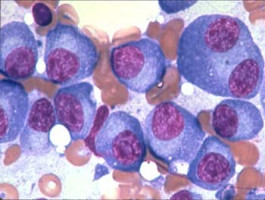
Results have been announced from an open-label, Phase II study evaluating the safety and efficacy of oral, single-agent ixazomib (MLN9708) as maintenance therapy in patients with multiple myeloma (MM) who had received ixazomib, lenalidomide and dexamethasone as induction therapy.
The data from this trial demonstrate the potential feasibility of single-agent ixazomib maintenance therapy following 12 cycles of ixazomib-lenalidomide-dexamethasone, with deepening responses and an acceptable tolerability profile.
These data were presented at ASH 2014.
“These findings suggest that treatment with single-agent ixazomib, an investigational oral proteasome inhibitor, in the maintenance setting has the potential to extend depth of response for patients following induction therapy,” said Shaji K. Kumar, MD, Mayo Clinic, Rochester, NY.
“The future availability of such an agent in the maintenance setting could represent an important addition to the treatment of patients with multiple myeloma.”
“These data suggest that as an oral proteasome inhibitor, ixazomib may be an important new agent for further clinical investigation in the maintenance therapy of multiple myeloma," said Michael Vasconcelles, M.D., Head, Oncology Therapeutic Area Unit, Takeda.
“Indeed, we have recently initiated enrolment into our Phase 3 TOURMALINE-MM3 study to assess the potential benefit of single-agent ixazomib following autologous stem cell transplant. We look forward to this study completing enrolment and follow up, so that important new information about the use of ixazomib in the maintenance setting may be learned.”
The primary objective of the phase II component of the study was the percent of patients achieving a very good partial response [VGPR] or better (defined as complete response [CR] VGPR).
Fifty patients were enrolled in the Phase 2 cohort and received ixazomib, lenalidomide and dexamethasone as induction therapy for up to twelve 28-day cycles.
Transplant-eligible patients could discontinue from the study for autologous stem cell transplant (ASCT) after six cycles.
For those patients continuing on to receive ixazomib maintenance, treatment could continue until disease progression or unacceptable toxicity.
All patients who received ixazomib maintenance therapy had responded to induction therapy.
During induction (cycles 1–12), 29 patients discontinued study treatment, primarily to undergo autologous stem cell transplant (ASCT) (14/50).
Other reasons included AEs (6/50), patient withdrawal (4/50), disease progression (2/50), and unsatisfactory response (1/50), among other factors (2/50).
Twenty-one patients completed induction and progressed to the maintenance phase of the study, during which they received single-agent ixazomib for a median of 19 treatment cycles (range 3-23), with a median treatment duration of 29.0 months (range 14.3-33.3).
The abstract, titled “Long-Term ixazomib maintenance is tolerable and improves depth of response following ixazomib-lenalidomide-dexamethasone induction in patients (pts) with previously untreated multiple myeloma (MM): Phase 2 study results [Abstract #82]” was delivered as an oral presentation by Shaji K. Kumar, MD, Mayo Clinic, Rochester, MN.